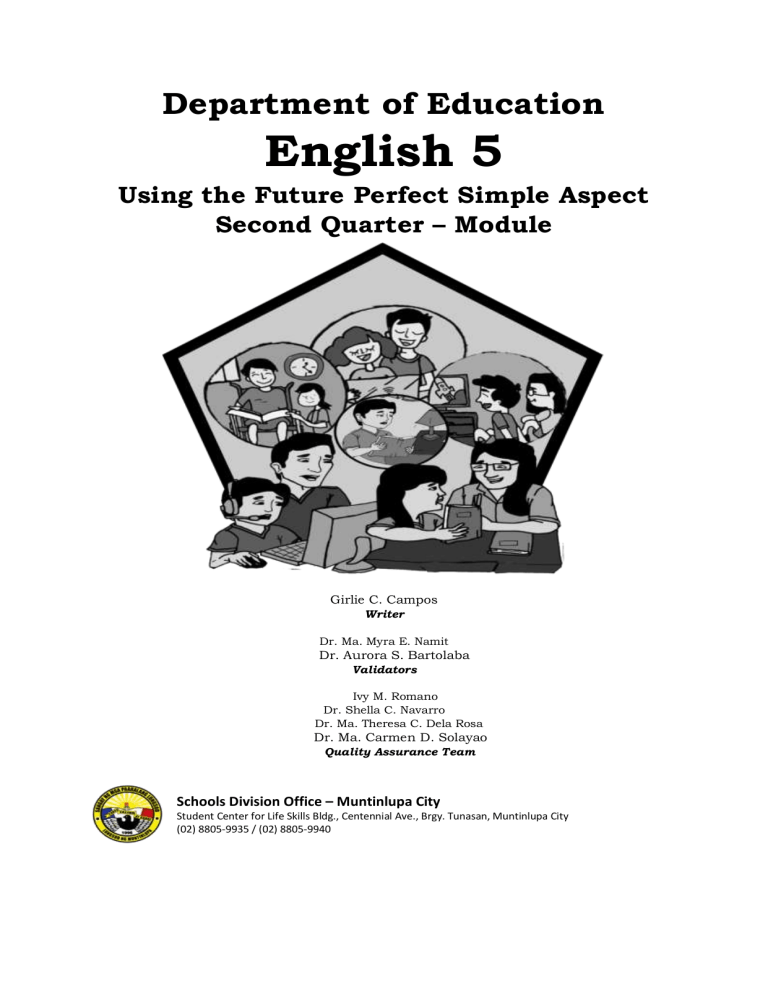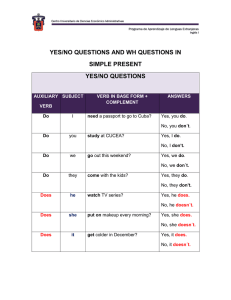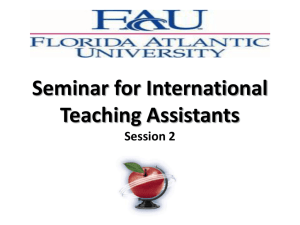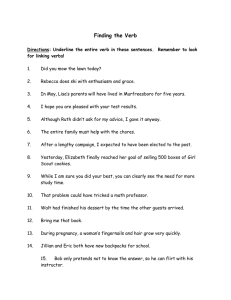
Department of Education English 5 Using the Future Perfect Simple Aspect Second Quarter – Module Girlie C. Campos Writer Dr. Ma. Myra E. Namit Dr. Aurora S. Bartolaba Validators Ivy M. Romano Dr. Shella C. Navarro Dr. Ma. Theresa C. Dela Rosa Dr. Ma. Carmen D. Solayao Quality Assurance Team Schools Division Office – Muntinlupa City Student Center for Life Skills Bldg., Centennial Ave., Brgy. Tunasan, Muntinlupa City (02) 8805-9935 / (02) 8805-9940 This Supplementary Learning Module (SLeM) is written with you in mind. It is here to help you use the future perfect simple aspect of verb. Also, this module offers many different learning situations that may help you deal with facts selectively which is a characteristic of a smart young Muntinlupeño. The language and vocabulary used in this module fit to the Grade 5 learners. After going through this module, you are expected to: 1. Form the future perfect simple aspect of verb; 2. Recognize the use of before-clause, by-clause and by the time-clause for future perfect aspect of verb; and 3. Use the future perfect simple aspect of verb. Directions: In your own answer sheet, write YES if a sentence uses the future perfect simple aspect of verb; NO if it is not. _________ 1. Before the pandemic, I had bought a costume for a school program. _________ 2. Jed will buy masks and a face shield so he will always be protected. _________ 3. By April 2021, the world will have a vaccine against covid-19. _________ 4. Fiona will have bought a new personal computer before this year ends. _________ 5. My parents have been selling pork and chicken since June 2020. _________ 6. Before the pandemic ends, he will have learned how to bake. __________ 7. They are going to repair their store to adjust to the new normal. __________ 8. Patrick will have repaired his bike by the time he goes back to work. __________ 9. Before I lost my work last May, I had saved some amount of money. __________10. Diane will have planted flowering plants by next March. 2 A. Directions: In your own answer sheet, copy the correct form of the verb from the parentheses. 1. I ( have been writing, had written ) my report in Science before the date of submission came. 2. Since last week, Franz ( has been taking, had taken ) antibiotic for his cough. 3. My parents ( have been looking, had looked ) for a second-hand laptop for a month now. 4. When the water went off yesterday morning, all of us ( have been taking, had taken ) a bath. 5. Before Janice called her father on the phone this afternoon, her father ( has been leaving, had left ) home. B. Directions: Change the verb inside the parentheses to future form. An example was done for you. Example: Ruel ( play ) _________________ basketball this coming Saturday. Answer: will play Begin here: 1. Next April, the Cruz Family ( go ) _______________ to Ilocos for a vacation 2. They ( start ) _______________ buying things needed for their vacation this coming Sunday. 3. In 2023, Mr. and Mrs. Cruz ( put up ) ___________________ a milk tea store. 4. The Cruz siblings ( enroll ) _____________________ in a swimming lesson next school vacation. 5. They ( practice )___________________ still practice health protocol to avoid getting sick. 3 C. In your answer sheet, copy the correct present form of the verbs of from the parentheses. 1. Grace and I ( receives, receive ) our allowance every Sunday. 2. I always ( saves, save ) a little amount from my allowance. 3. We only ( brings, bring ) exact amount of money to school. 4. Our father ( teaches, teach ) us how to spend money wisely. 5. On Fridays, Grace ( buys, buy ) her favorite fast food meal. D. Directions: Write the past participle form of the following verbs. 1. do 6. teach 2. finish 7. give 3. read 8. watch 4. write 9. load up 5. submit 10. send This module is the last one among the perfect aspect lessons you have been taking up for this quarter. Like the present perfect continuous and past perfect aspects, the future perfect simple perfect aspect joins two actions that will happen in the future. Learning how to use the future perfect simple perfect aspect of verb in sentences will improve the way you tell your ideas. Study well this module so you would have a perfect future! 4 To present the lesson to you, here is a short dialog: One Tuesday, Mac-Mac and Chin-Chin, both Grade 6 learners, were talking about their plans about their tasks. Chin-Chin: Friday is coming soon, Mac-Mac. We will submit our tasks on that day. I will finish my album of household chores for TLE. Mac-Mac: I have a task, too, to submit this Friday. I will write a poem for Filipino. I have to do it now. My Grandfather and I will go fishing this coming Thursday. Chin-Chin: That’s good! Study first before anything else. Mac-Mac: You got it, Chin-Chin! Think and Search a. According to the dialog, what is Friday for? b. What task will Chin-Chin do? How about Mac-Mac? c. What value do the two children show? Now that you understand the text or the dialog above, let us begin our discussion on how to use the future perfect simple aspect. Let us analyze the following: a. Chin-Chin will finish her album of household chore for TLE. She will submit that on Friday. (This means that there are two actions that will happen in the future where the act of finishing the TLE album will have been completed or done first before Friday. Now, there is another and much better way to tell or write these two sentences and it is through the use of the future perfect simple aspect. ) Look at the next sentences and their parts: subject verb in future perfect simple aspect object time clause New sentence: Chin-Chin will have finished her album of household chores for TLE by Friday. helping verb time clause subject Or: By Friday, Chin-Chin main verb in past participle form verb in future perfect simple aspect will have finished helping verb object her album of household chores for TLE. main verb in past participle form Or: Chin-Chin will have finished her album of household chores for TLE before Friday. Or: Before Friday, Chin-Chin will have finished her album of household chores for TLE. 5 As you observe, there are four parts of a sentence in future perfect simple aspect and they are subject, verb in future perfect simple aspect form which is made of the helping verb ‘will have’ + the past participle form of the main verb, object which answers what (Question: What will Chin-Chin have finished? Answer: her album of household chores in TLE) and a time clause like by + time or before + time. Also, you have seen that time clause may be put in the beginning of a sentence and a comma (,) is added after it. To sum up, the future perfect simple aspect of verb expresses or tells an action that will have been completed or done first before a time in the future comes. Here are language patterns for making sentences using the future perfect simple aspect: a. subject + will have + past participle of the main verb + object + by-clause (time) Or: by-clause (time), + subject + will have + past participle of the main verb + object This time, let us do the same with the ideas of Mac-Mac: b. I will write a poem for Filipino. I have to do it now. My Grandfather and I will go fishing this coming Thursday. (This means that the act of writing a poem in Filipino will have been completed or done first before Friday comes or before Mac-mac and his grandfather go fishing on Thursday. ) Look carefully at the new sentence as it makes Mac-Mac’s three ideas into only one and that is through the use of future perfect simple aspect: New Sentence: Mac-Mac will have written his poem for Filipino by the time he and his grandfather go fishing on Thursday. plural simple present form (not ending in –s) Or: By the time he and his grandfather go fishing on Thursday, Mac-Mac will have written his poem for Filipino. The parts are just the same with the sentences above. Only, the time clause used here is by the time-clause. And when the by the time-clause is used, it is followed by a noun or pronoun like he and his grandfather plus a verb in simple present form. With this, you apply the rules in using the present form of the verb like what you did in ‘Looking Back - Letter C’. To recall, the sform of the verb is used for singular noun or pronoun; use the simple present form (not ending in –s) for plural noun or pronoun. Here are another examples: c. We will have submitted our Science project by the time another subject teacher gives us a project. singular noun 6 s-form of verb Or: By the time another subject teacher gives us a project, we will have submitted our Science project. As a summary, the future perfect simple aspect of verb is also used to expresses or tells an action that will have been completed or done first before another event in the future takes place or happens. The following are the language patterns: b. subject + will have + past participle form of the main verb + object + by the time + singular noun or pronoun + s-form of the verb Or: by the time + singular noun or pronoun + s-form of the verb + subject + will have + past participle form of the main verb + object c. subject + will have + past participle form of the main verb + object + by the time + plural noun or pronoun + simple present form ( not ending in –s) of the verb Or: by the time + plural noun or pronoun + simple present (not ending in –s) form of the verb + subject + will have + past participle form of the main verb + object Activity 1 Directions: Fill in the blanks with will have and the past participle form of the main verb enclosed in parentheses. 1. By December, I ( save ) ______________ some amount for a brand new cellphone 2. David ( recharge ) ____________his laptop by the time he goes to work. 3. Before 10 o’clock in the morning tomorrow, we ( do ) ___________ our duties at home. 4. The jeepney driver ( earn ) ____________ enough before eight o’clock tonight. 5. By the time the visitors arrive, the program ( start ) ____________. 7 ACTVITY 2 Directions: Complete each by-clause or before-clause in the following sentences. 1. Zyrene will have memorized the song by _____________________. 2. Before ___________________, Bernard will have taken a bath. 3. By ____________________, Pamela will have graduated from elementary. 4. The taho vendor will have sold out his taho before ____________________. 5. Allan will have answered his modules by ________________________. ACTVITY 3 Directions: Write the correct simple present form of the verbs enclosed in parentheses. 1. By the time my Mother ( come ) _______ back home, my brother will have fed the pigs. 2. I will have loaded up my cellphone by the time I ( join ) _____a video call. 3. By the time we ( watch ) ________ a movie, we will have eaten our lunch. 4. Mr. Romero will have delivered the mails by the time it ( rain ) ________. 5. By the time the twins ( wake ) ________ up, I will have washed our clothes Directions: List down the three (3) language patterns in using the future perfect simple aspect of verb in sentences. Language Pattern 1: _____________________________________________________________________ Language Pattern 2: _____________________________________________________________________ Language Pattern 3: ____________________________________________________________________ Language Pattern 4: _____________________________________________________________________ Language pattern 5: _____________________________________________________________________ Language Pattern 6: _____________________________________________________________________ 8 Directions: The Year 2020 is about to end. With that, ask at least four (4) of your family members about one of their plans or actions that they will have done before 2020 ends. For each family member, write one sentence using the future perfect simple aspect of verb starting from the given time clause. Use their names as subject of the sentence. In your own paper, copy the following - ___ By the time year 2020 ends, - - POST TEST Directions: Draw a aspect of verb correctly; a if a sentence uses the future perfect simple if the sentence does not. _________1. Allysa will have go to the dentist before she has a toothache again. _________ 2. By January 2021, Bernard will have made his plans for the new year. _________ 3. Charina will have taken a bath before the school service picks her up. ________ 4. The farmers will plant the seeds before the rainy season comes. ________ 5. Before next Saturday, I have done with my performance task in Health 6. _______ 6. By this coming Tuesday, Edmund will finish watching three videos about fractions and decimals. ______ 7. Francheska will have washed her PE uniform by the time it rains again. ______ 8. Gary will have played his favorite computer game before dinner time. 9 ______ 9. Before lunch time tomorrow, Aunt Hazel will have cooked dishes for their visitors. _____ 10. Jasmine will have changed their curtains by the time her birthday comes. ANSWER KEY Pre-Test 1. No 2. No 3. Yes 4. Yes 5. No 6. Yes 7. No 8. Yes 9. No 10. Yes Looking Back Check Your Post-Test Understanding A. Activity 1 A. 1. 1. have been 1. will have (Answers may 2. writing saved vary.) 2. had taken 2. will have 3. 3. have been recharged B. looking 3. will have (Answers may 4. 4. had taken done vary.) 5. 5. had left 4. will have 6. earned B. 5. will have 7. 1. will go started 8. 2. will start 9. 3. will put up Activity 2 4. will enroll (Answers may 10. 5.will practice vary.) C. 1. receive 2. save 3. bring 4. teaches 5. buys Activities Activity 3 1. comes 2. join 3. watch 4. rains 5. wake D. 1. done 2. finished 3. read /red/ 4. written 5. submitted 6. taught 7. given 8. watched 9. loaded up 10. sent 10






